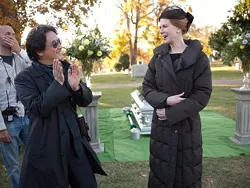At 42, Park Chan-Wook is one of Korea’s most commercially successful directors. Starting out as a philosophy student before starting a career as film critic then filmmaker, the Seoul-based filmmaker has come to be known as a master craftsman, creating aesthetically inventive imagery and brutal dream-like narratives. But when it comes to the thematic and narrative impact of his work, Park tends to divide critics. Some, like New York Times critic Manohla Darghis, dismiss his movies as empty exercises in gorgeously rendered cruelty and violence. Others see the auteur as a moral stylist who has more to say than some give him credit for.
Stoker, his ninth feature film and English-language debut, probably won’t do much to settle that debate. A creepy coming-of-age tale, it stars Mia Wasikowska as a young girl dealing with the death of her father, a distant and jealous mother (Nicole Kidman), and the arrival of a potentially unhinged uncle (Matthew Goode). Despite its American studio pedigree, the movie remains very much a Park Chan-Wook film, complete with perversity, murder, and psychological suspense.
Working through a translator, we chatted with the director over the phone about his work. Some nuances in the conversation were undoubtedly lost in translation.
Metro Times: There’s a fairy tale-like quality to Stoker that defies geography. Is this a Western film or a Park Chan-Wook film cast with Western actors?
Park:It’s difficult to categorize things as either this or that. Hitchcock (who was British) made many films in America. Are they American films or are they Hitchcock films with American actors in them? If I was forced to pick an answer I would say I am always aware of where my films are financed
MT: Looking at your work, films like Oldboy, Thirst and Lady Vengeance, it’s clear you have a particularly dark and irreverent sense of humor. Did you have any concerns that some of that might be lost in translation?
Park:I did worry about that before starting the project. Finding a really good translator was, of course, very important but so was working directly with the American writer during the polishing stage. In discussions with my actors, I spent time meticulously reviewing every line and the ideas behind them to make sure my intentions were always clear.
You know, with my Korean films, after they are completed, I would maybe see them once in a theater. With Stoker I’ve watched it multiple times with an audience specifically to make sure that all the intended bits of humor work properly. I’m happy to say that they do.
MT: Many of your films seem to include themes of family, toxic secrets, revenge and insanity. Does that come from someplace personal?
Park: Yes and no. Of course none of those extreme things come from my personal history. But in other aspects I’d say yes. In every family there is jealousy, hate and suspicion. I just exaggerate them in my films.
MT: I didn’t mean my question to be taken so literally. It’s just that I’ve noticed that many of your films focus particularly on the family unit, that there’s an almost claustrophobic approach to how they operate. In your films they are the source of some extreme, even evil behaviors. What intrigues you about this aspect of family?
Park: Well, a family is the smallest unit in the universe with which I can examine every state of human condition. I guess you could do that with a single person, but as an Asian filmmaker I feel that the family is the most intimate way to explore interpersonal relationships. I’m particularly drawn to the effects of violence, and its impact on the family.
MT: Your filmmaking takes a stylized approach to not just violence but to story in general. Do you think critics are too quick to dismiss stylists as serious artists? I think of filmmakers like Quentin Tarantino or Michael Mann who are respected, but never with quite the same gravitas as, say, Paul Thomas Anderson or Robert Altman.
Park: Really? Maybe you’re right. However I think there’s an argument against that notion. Hitchcock is probably the best example. Looking at the recent Sight and Sound poll Vertigo was voted as the No. 1 film, overtaking Citizen Kane. Hitchcock was a true stylist, he was at the apex of stylist filmmakers.
MT: Yes, but he wasn’t fully recognized in his time that way. He was certainly respected but only later regarded as the artist we consider him today. It seems to me that a lot of focus is put on the stylistic choices certain directors make rather than the substance and depth of vision behind their work. I think that may be why certain directors come to be seen as important only in retrospect.
Park: Well, even if Hitchcock wasn’t recognized for his art by his contemporaries, he did earn a lot of money. I hope I can say the same about myself.
Jeff Meyers reviews films for Metro Times. Send comments to [email protected].







